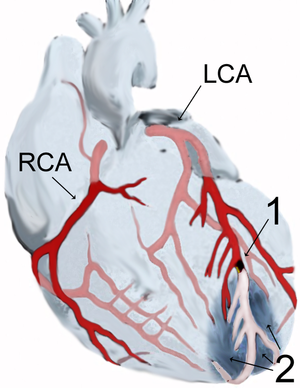Myocardial infarct
| Myocardial infarction | |
|---|---|
| Synonyms | Acute myocardial infarction (AMI), heart attack |
 |
|
| Diagram showing the blood supply to the heart by the two major blood vessels, the left and right coronary arteries (labelled LCA and RCA). A myocardial infarction (2) has occurred with blockage of a branch of the left coronary artery (1). | |
| Specialty | Cardiology |
| Symptoms | Chest pain, shortness of breath, nausea, feeling faint, cold sweat, feeling tired |
| Complications | Heart failure, irregular heartbeat, cardiogenic shock, cardiac arrest |
| Causes | Usually coronary artery disease |
| Risk factors | High blood pressure, smoking, diabetes, lack of exercise, obesity, high blood cholesterol |
| Diagnostic method | Electrocardiograms (ECGs), blood tests, coronary angiography |
| Treatment | Percutaneous coronary intervention, thrombolysis |
| Medication | Aspirin, nitroglycerin, heparin |
| Prognosis | STEMI 10% risk of death (developed world) |
| Frequency | 15.9 million (2015) |
| Classification |
· ·
|
|---|---|
| External resources |
Myocardial infarction (MI), commonly known as a heart attack, occurs when blood flow decreases or stops to a part of the heart, causing damage to the heart muscle. The most common symptom is chest pain or discomfort which may travel into the shoulder, arm, back, neck, or jaw. Often it occurs in the center or left side of the chest and lasts for more than a few minutes. The discomfort may occasionally feel like heartburn. Other symptoms may include shortness of breath, nausea, feeling faint, a cold sweat, or feeling tired. About 30% of people have atypical symptoms. Women more often have atypical symptoms than men. Among those over 75 years old, about 5% have had an MI with little or no history of symptoms. An MI may cause heart failure, an irregular heartbeat, cardiogenic shock, or cardiac arrest.
Most MIs occur due to coronary artery disease. Risk factors include high blood pressure, smoking, diabetes, lack of exercise, obesity, high blood cholesterol, poor diet, and excessive alcohol intake, among others. The complete blockage of a coronary artery caused by a rupture of an atherosclerotic plaque is usually the underlying mechanism of an MI. MIs are less commonly caused by coronary artery spasms, which may be due to cocaine, significant emotional stress, and extreme cold, among others. A number of tests are useful to help with diagnosis, including electrocardiograms (ECGs), blood tests, and coronary angiography. An ECG, which is a recording of the heart's electrical activity, may confirm an ST elevation MI (STEMI) if ST elevation is present. Commonly used blood tests include troponin and less often creatine kinase MB.
...
Wikipedia
